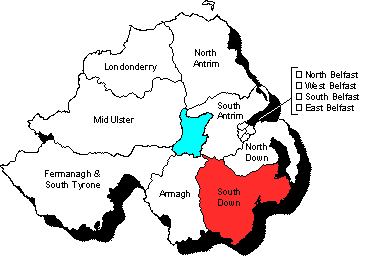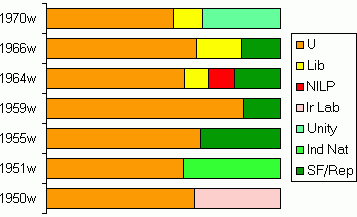

 |

|
| |
| |

|

|
| Map and diagram by Conal Kelly | |
This constituency takes in the largely rural south-eastern corner of Northern Ireland, covering much of county Down. Established in 1948, the constituency incorporated a large portion of the old Down two-seat constituency. Between 1950 and 1970 the constituency was represented by just one Unionist MP, Capt. Lawrence Story Orr. First elected in 1950, Orr would continue to represent the constituency until his retirement in 1974. All seven elections held during this period were contested. The constituency recorded the lowest turnout in the 1959 general election.
See also election results for South Down 1973-1982, 1983-1992 and 1993-2007.
| U | Lib | NILP | Ir Lab | Ind Nat | Unity | SF/Rep | |
| 1970w | 54.3% | 12.0% | 33.7% | ||||
| 1966w | 64.0% | 18.7% | 17.4% | ||||
| 1964w | 59.0% | 10.0% | 11.2% | 19.8% | |||
| 1959w | 84.2% | 15.8% | |||||
| 1955w | 65.9% | 34.1% | |||||
| 1951w | 58.3% | 41.7% | |||||
| 1950w | 63.5% | 36.5% |
Unionist majority: 13,218; electorate: 87,079; votes cast: 73.9%
Having represented the constituency for over 20 years, Orr stood once again in the 1970 general election. John Quinn, the Liberal candidate who finished second in 1966, was running for the second time. For the first time since 1955 there was no republican contesting South Down, instead Hugh Golding was the nationalist candidate, standing on a Unity ticket. Golding polled well capturing almost 34% of the vote but the winner was never in doubt and Orr won his seventh term in what would be his penultimate contest. Fielding only three candidates in the election, this was the Liberals' best result in 1970.
Unionist majority: 23,959; electorate: 78,096; votes cast: 65.8%
The incumbent Orr once again defended his seat in the 1966 general election. Republican candidate George Mussen was contesting the seat for the second time, while the Liberals looked to a new candidate, John Quinn. The NILP did not run a candidate this time round. Orr was returned for his sixth term with a comfortable majority of almost 24,000. Interestingly Quinn, the Liberal candidate, out-polled the Republican Mussen, reversing the order of the 1964 result.
Unionist majority: 21,891; electorate: 77,391; votes cast: 72.1%
Orr once again represented the Unionist Party in South Down, seeking his fifth successive win. His main opponent on this occasion was George Mussen, standing on a Republican abstentionist ticket (Sinn Fein was now a proscribed organization). Representing the NILP was Belfast playwright Sam Thompson. The Liberals rounded out the field with their candidate Hamilton Simmonds-Gooding. The result was never really in doubt with Orr winning by a comfortable margin, although his majority was reduced to just under 22,000. Mussen managed to improve on the Sinn Fein result of 1959 but still short on their 1955 performance.
Unionist majority: 29,947; electorate: 77,627; votes cast: 56.4%
The incumbent Orr once again squared-off with his Sinn Fein opponent Kevin O'Rourke in a repeat of the 1955 election. Orr successfully defended his seat and increased his majority to almost 30,000. In a lower turnout than 1955, the Sinn Fein vote declined significantly. This was a trend repeated elsewhere in Northern Ireland in light of the IRA's divisive Operation Harvest campaign.
Unionist majority: 18,297; electorate: 77,832; votes cast: 73.9%
Seeking a third
consecutive term, the incumbent Orr once again defended his seat in the
1955 general election. His opponent was Kevin O'Rourke representing
Sinn Fein on an abstentionist ticket. Orr achieved a comfortable victory,
increasing his majority to over 18,000.
Orr would go on to become leader of the Unionist MPs at Westminster, a
position he held until his retirement in 1974. In 1955 Orr also revived
the House of Commons Orange Lodge (LOL 1688).
Unionist majority: 10,813; electorate: 79,001; votes cast: 82.0%
Orr was once again the Unionist candidate in 1951, defending the seat he had won just 18 months earlier. The most interesting aspect of the contest in South Down was Orr's opponent, Gerald Annesley. Annesley, a protestant and owner of the Castlewellan Estate (now Castlewellen Forest Park) surprised many people by standing as an Independent Nationalist on an anti-partition ticket. Annessley performed well capturing over 40% of the poll but in the end Orr was returned for a second term albeit with a reduced majority.
Unionist majority: 16,332; electorate: 79,125; votes cast: 76.7%
The 1950 general
election saw the elimination of the Down two-seat constituency which was
replaced by North Down and South Down. In the absence of an incumbent
the Unionists selected leading Orangeman (and future Imperial Grand Master),
Captain Lawrence Orr as their candidate. His opponent was Belfast trade
union activist Jack Macgougan, representing the Irish Labour Party. He was
one of only two Irish Labour Party candidates in 1950, the other being
West Belfast candidate Jack Beattie. The result was a victory for Orr with
a fairly comfortable majority of over 16,000.
Jack Macgougan also stood unsuccessfully for the Northern Ireland House of
Commons in the general elections of 1938 (Belfast Oldpark) and 1953
(Belfast Falls).
See also:
Results from 1950 to 1970 for each seat: East Belfast | North Belfast | South Belfast | West Belfast | North Antrim | South Antrim | Armagh | North Down | South Down | Fermanagh and South Tyrone | Londonderry | Mid Ulster
Other sites based at ARK: ORB (Online Research Bank) | CAIN (Conflict Archive on the INternet) | Northern Ireland Life and Times Survey
Your comments, please! Send an email to me at nicholas.whyte@gmail.com.
Conal Kelly, 1 June 2007.
|
Disclaimer:©
Nicholas Whyte 1998-2004 Last Updated on Wednesday, 12-Jan-2005 12:12
|